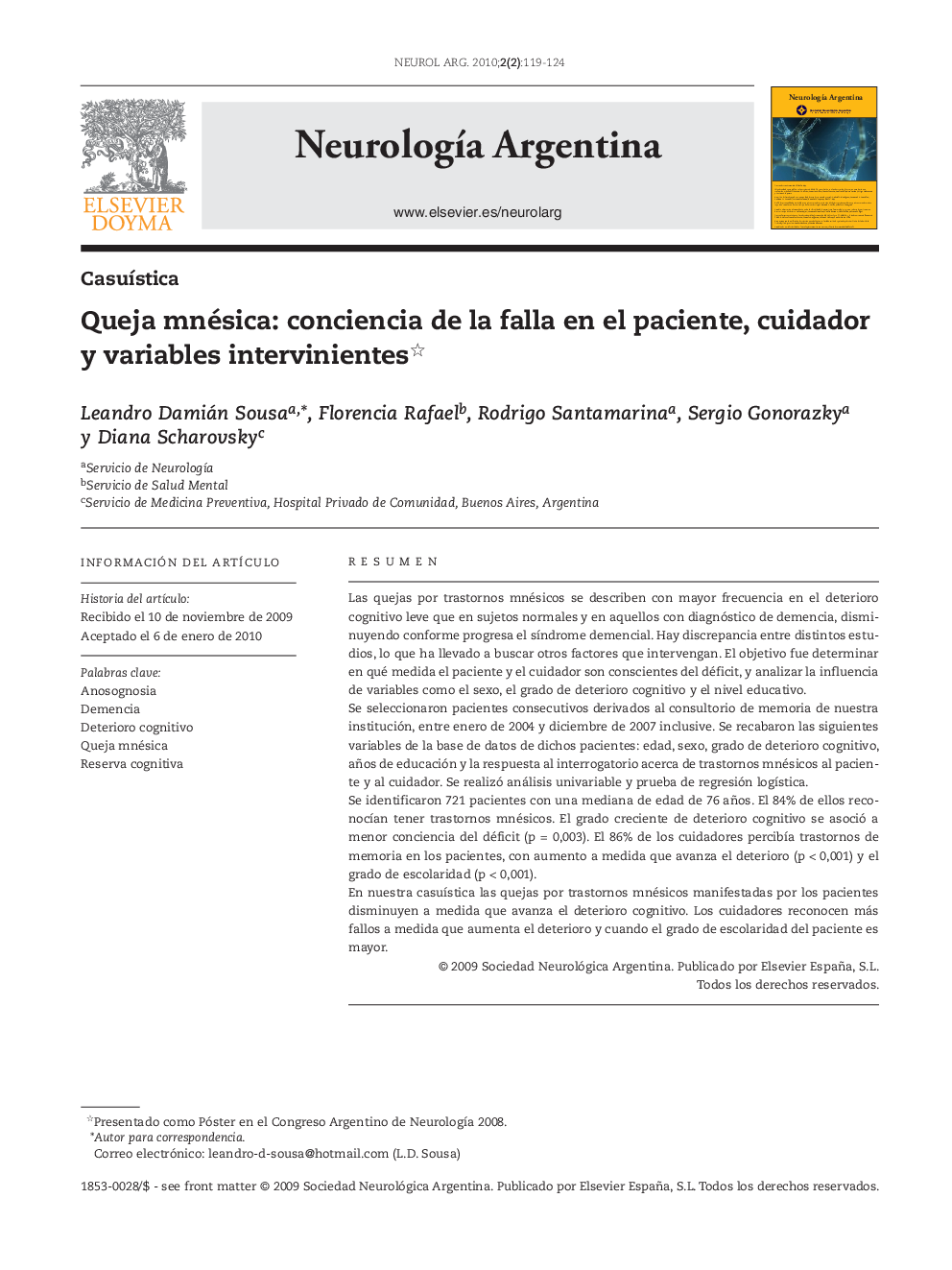| Article ID | Journal | Published Year | Pages | File Type |
|---|---|---|---|---|
| 3076812 | Neurología Argentina | 2010 | 6 Pages |
ResumenLas quejas por trastornos mnésicos se describen con mayor frecuencia en el deterioro cognitivo leve que en sujetos normales y en aquellos con diagnóstico de demencia, disminuyendo conforme progresa el síndrome demencial. Hay discrepancia entre distintos estudios, lo que ha llevado a buscar otros factores que intervengan. El objetivo fue determinar en qué medida el paciente y el cuidador son conscientes del déficit, y analizar la influencia de variables como el sexo, el grado de deterioro cognitivo y el nivel educativo.Se seleccionaron pacientes consecutivos derivados al consultorio de memoria de nuestra institución, entre enero de 2004 y diciembre de 2007 inclusive. Se recabaron las siguientes variables de la base de datos de dichos pacientes: edad, sexo, grado de deterioro cognitivo, años de educación y la respuesta al interrogatorio acerca de trastornos mnésicos al paciente y al cuidador. Se realizó análisis univariable y prueba de regresión logística.Se identificaron 721 pacientes con una mediana de edad de 76 años. El 84% de ellos reconocían tener trastornos mnésicos. El grado creciente de deterioro cognitivo se asoció a menor conciencia del déficit (p = 0,003). El 86% de los cuidadores percibía trastornos de memoria en los pacientes, con aumento a medida que avanza el deterioro (p < 0,001) y el grado de escolaridad (p < 0,001).En nuestra casuística las quejas por trastornos mnésicos manifestadas por los pacientes disminuyen a medida que avanza el deterioro cognitivo. Los cuidadores reconocen más fallos a medida que aumenta el deterioro y cuando el grado de escolaridad del paciente es mayor.
Memory complaints are described more frequently in subject with mild cognitive impairment than in normal subjects and in those with diagnostic of dementia, decreasing as the demential syndrome progresses. There are differences between different studies, what has led to search for other factors involved. The aim of the present work is to determine to what extent the patient and the caregiver are aware of the deficit, and to analyze the influence of variables like sex, degree of cognitive impairment and educational level.Consecutive patients from the cognitive department of our institution were selected between January 2004 and December 2007, inclusive. The following variables were collected: age, sex, degree of cognitive deterioration, years of education and the answer to the question about the mnesic complaints made to the patient and the caregiver. A univariable analysis and logistic regression were performed.Seven hundred and twenty two patients were identified, with a median age of 76 years; 84% of them recognized to have memory problems. Increasing cognitive impairment was associated with less aware of the amnesic deficit (p = 0,003). Eighty-six percent (86%) of the caregivers perceived memory impairment in patients, which increased with the progression of amnesic deterioration (p < 0,001) and educational degree (p < 0,001).In our series, the patient's memory complaints decrease as the cognitive impairment progresses. The caregivers recognize more defects when the impairment increases, and when patient's schooling degree is higher.
